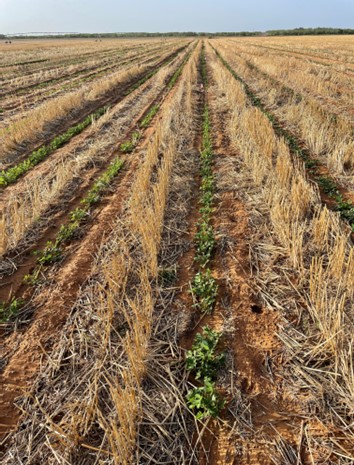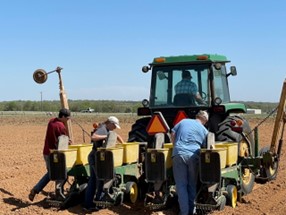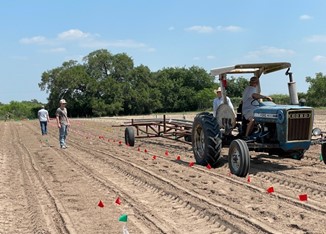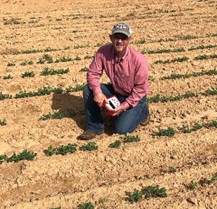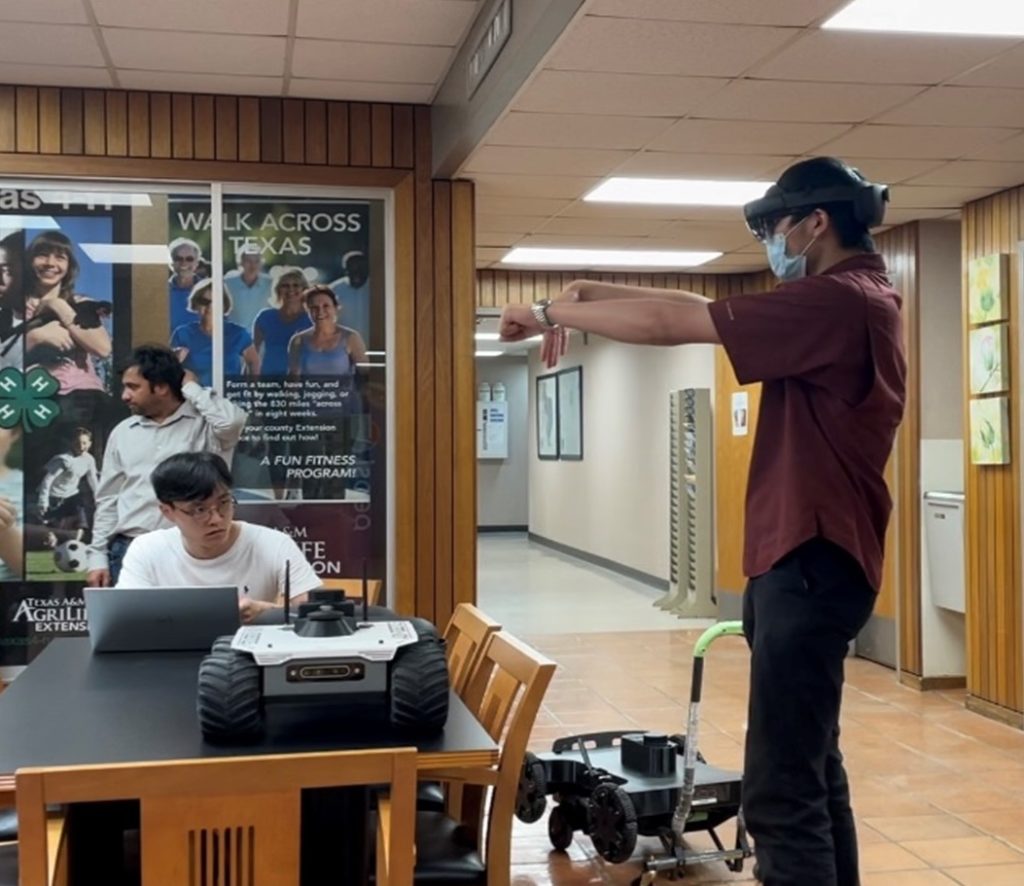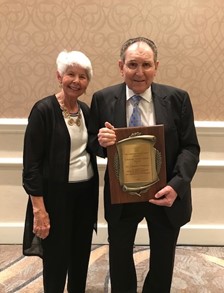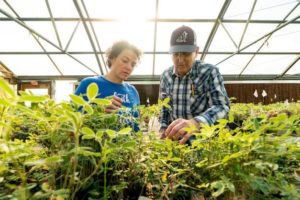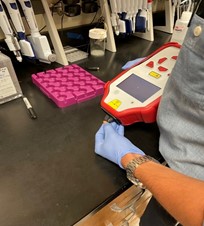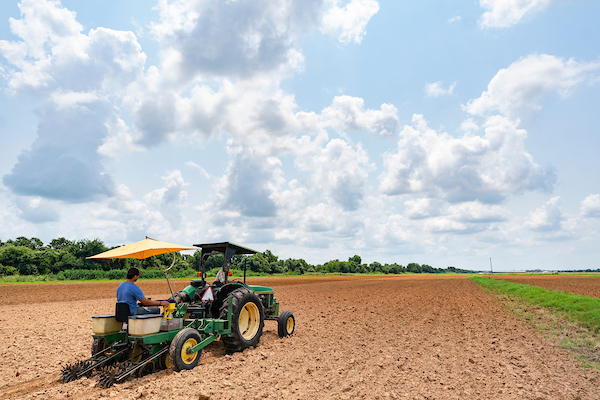Issue 24 / December Edition

Happy holidays, and welcome to our end-of-the-year newsletter! We are excited to be back sharing updates about our groundbreaking research and new social media platforms.
In this issue
Community Update | Student Spotlight | Endophytes | The Simpson Section | Peanut Brittle Recipe | Contact
The Old, the New, and Everything Else the Peanut Team Has Been Up To!

In our last newsletter, we were just beginning the ‘Diesel Nut‘ project —now, two and a half years in, the project is thriving! The project’s main objectives include breeding high-oil-content peanut varieties, assessing the economic and environmental impacts, exploring endophyte-peanut relationships, developing improved crop management practices, and conducting grower outreach efforts. The project’s steady progress has even inspired successful spin-off initiatives.
One of these spin-offs focuses on creating a new market for peanut oil. While peanuts are already crushed for cooking oil, the current supply must meet national demand. Demand will rise even further if peanut oil becomes a key ingredient in renewable biodiesel. Earlier this year, Drs. John Cason and Luis Ribera from Texas A&M AgriLife received a three-year grant from the U.S. Department of Agriculture National Institute for Food and Agriculture. Their research will evaluate the economic potential of establishing a market for high-oil peanuts. For more details, check out the full press release on AgriLife Today.
In the upcoming newsletters, we will continue to highlight the fascinating and innovative research underway and introduce you to the incredible individuals making it all possible.
We would also like to express our gratitude to our patrons for their continued support. Your generosity and dedication assist us in our mission to bring innovative and effective solutions to Texas peanut growers.
Enjoy this newsletter!
Student Researcher Spotlight

Hey guys! My name is Claire, and this month I will graduate with a Bachelor of Science in Biomedical Sciences and minor in Political Science from Tarleton State University. I’ve had the privilege of working with the AgriLife Peanut Team for three years and have enjoyed my time working with endophytes. I am grateful for the opportunity to work on something outside of my degree and have the chance to expand my horizons. In May I take my MCAT for medical school to begin my next chapter in life.
Endophytes: The New Peanut Partners
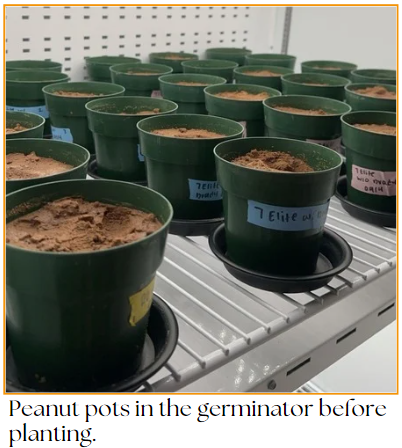
Nature is full of fascinating mutualistic relationships, such as the one between nitrogen-fixing bacteria and legumes. Dr. Jeff Brady and his research team are studying another remarkable example: the partnership between peanuts and beneficial soil microbes known as endophytes. As part of the ‘Diesel Nut’ project, the team is identifying endophytes that help peanuts tolerate drought and resist diseases. Early greenhouse trials have shown encouraging results, with some bacterial strains delaying drought stress in young peanut plants. While the initial trials used potting soil, the next phase will use sandy loam topsoil to determine if these early benefits hold up in a more realistic growing environment.
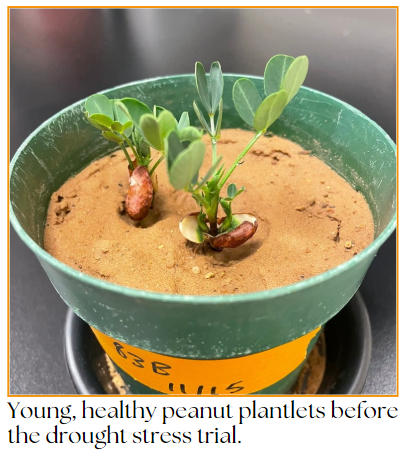
Claire Toalson, an undergraduate researcher in Dr. Brady’s lab, leads the endophyte screening portion of the project. The protocol begins by introducing endophytes using one of two methods: seed soak or soil drench. The seed soak method involves soaking peanut seeds in an endophyte solution before planting, whereas the soil drench method applies the solution directly to the soil after planting. Once treated, seeds are planted in 6-inch plastic pots and grown for four weeks in a germinator. After this period, water is withheld for two weeks to simulate drought stress. The plants are monitored daily for signs of leaf wilting, a key indicator of drought stress.
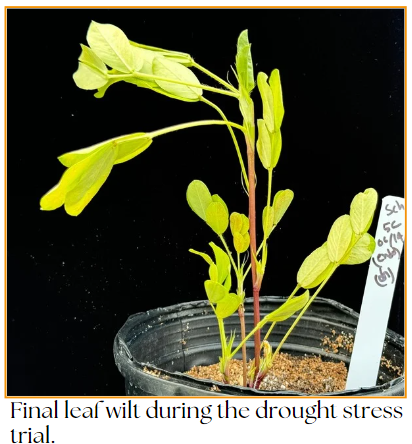
Like any research project, this study has faced a few challenges. Fungal growth has occasionally occurred during seed germination, prompting the addition of fungicide to the protocol as a preventative measure. However, researchers are still investigating whether the fungicide impacts the effectiveness of the endophytes. Another key consideration is the endophyte delivery method, as initial results have revealed trade-offs. The seed soak method produces a greater number of plants overall, while the soil drench method results in fewer but more robust plants. Depending on the project’s specific goals—whether to maximize plant numbers or enhance individual plant vigor—one method may prove more advantageous than the other.
As the research progresses, the team looks forward to refining these methods, overcoming challenges, and ultimately identifying the most effective endophytes for summer field trials.
The Simpson Section
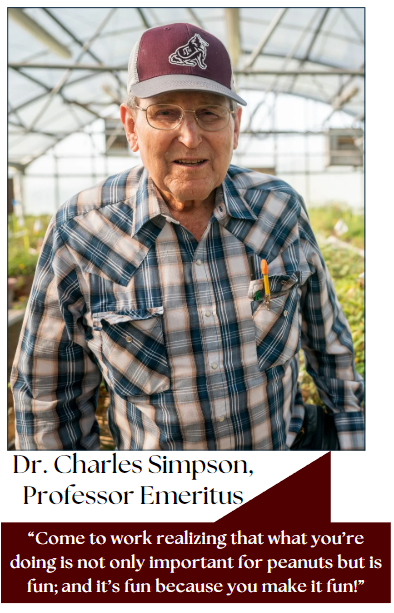
Dr. Simpson began his work as a peanut breeder in 1967 and has spent 57 years improving peanut crops through his study of wild peanut species. Over the course of his career, he went on 28 expeditions to South America, where peanuts naturally grow, to collect samples for research and conservation. These samples helped him understand how different peanut species could be used to develop improved cultivars. One of these successes is COAN, the first peanut variety resistant to root-knot nematodes. He also laid the groundwork for developing high-oil peanuts, which contain 62% oil compared to the usual 48%, opening doors to projects like the ‘Diesel Nut’ and the high-oil peanut market.
Dr. Simpson’s contributions went beyond breeding peanuts. He worked with his colleague Dr. David Williams to translate Bonplandia, a monograph of 69 wild peanut species, increasing its accessibility to other peanut researchers and enthusiasts. His legacy lives on not only in the improved peanut varieties but also in the researchers inspired by his lifetime of dedication and innovation.
Lynann Simpson’s Famous Peanut Brittle
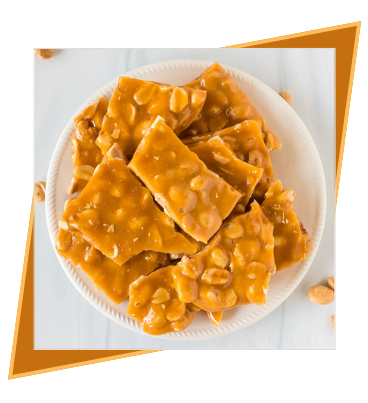
In the spirit of the holiday season, we are sharing the famous peanut brittle recipe revered by all who have tried it. Passed down from Mr. and Mrs. Langley in 1939, this beloved recipe has been perfected over the years by Dr. Simpson and his wife, Lynann. However, their first attempt at making the peanut brittle did not turn out as expected – they made the mistake of spreading the hot brittle, which removed all the air pockets and left it stuck to the pan and nearly inedible! Their tip for success? Never try to spread the brittle, let it settle naturally!
Directions:
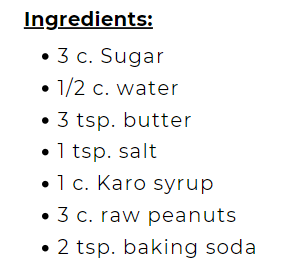
Measure the butter, soda and salt into a small dish and set aside. Lightly butter two cookie sheets and set aside. In a heavy saucepan, boil sugar, Karo and water until it spins a fine thread. Add peanuts; cook and stir continuously on medium temperature until the mixture turns brownish gold, about 11-12 minutes. Peanuts will pop and smell done. Remove from heat at once and add butter, salt, and baking soda all together. Stir only until the baking soda dissolves and pour out quickly on the two prepared cookie sheets. Do not smooth! After the brittle has hardened, break up and store in an air-tight container.
Contact Us
We’d love to hear from you! Please reach out to us with any questions about our research, newsletter, or donation opportunities.

Dr. John Cason
Associate Professor
John.cason@agnet.tamu.edu
254-974-9419

Taylor Duty
Student Worker
Taylor.duty@agnet.tamu.edu

Jansen Merrill
Director of Development
Jmerrill@txamfoundation.com
979-431-4148
